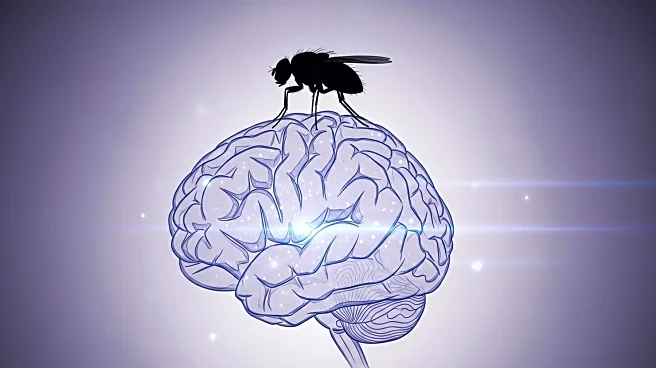What is the story about?
What's Happening?
Recent research has uncovered that a short photoperiod can significantly alter brain metabolism and increase cold resistance in Drosophila melanogaster, commonly known as fruit flies. The study found that under short-day conditions, these flies exhibit increased degradation of sugars, likely for the synthesis of fatty acids, and enhanced ammonia detoxification, autophagy, and resistance to oxidative stress. These changes are believed to prepare the brain for winter, potentially increasing the flies' lifespan. The research highlights that while the metabolism in the whole head and body remains unchanged, the brain specifically shows increased levels of energy storage lipids and structural lipids. This adaptation is thought to be a survival mechanism for the colder months.
Why It's Important?
This study provides insights into how environmental factors like day length can influence biological processes and longevity. Understanding these mechanisms in Drosophila melanogaster can offer broader implications for other species, including humans, as it highlights the potential for environmental conditions to impact metabolic pathways and lifespan. The findings could inform future research on aging and longevity, potentially leading to new strategies for enhancing lifespan and resilience in various organisms. Additionally, this research underscores the importance of considering environmental factors in biological studies, which could have implications for fields such as ecology, evolutionary biology, and even climate change research.
What's Next?
Further research could explore the specific genetic and molecular pathways involved in these metabolic changes, potentially identifying targets for interventions to enhance longevity. Additionally, studies could investigate whether similar mechanisms occur in other species and under different environmental conditions. This could lead to a deeper understanding of how organisms adapt to their environments and the potential for manipulating these processes to improve health and lifespan.
Beyond the Headlines
The study raises questions about the ethical implications of manipulating environmental conditions to alter biological processes. It also highlights the potential for using such research to address challenges related to climate change, as understanding how organisms adapt to changing environments could inform conservation strategies. Furthermore, the findings could contribute to discussions on the role of natural selection and adaptation in shaping the evolution of species.
















